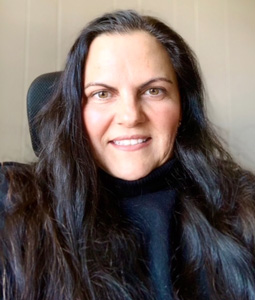When my son Oliver was about nine months old, I noticed some milestone delays. I also realized that he had a tic. He would get very excited – wailing – when he saw something that caught his attention. It was also around that time that I knew I had to quickly become his advocate.

Christina Silva-Soto, MS Ed, QIDP
Naturally, I wanted to find answers for Oliver as soon as possible. At fifteen months, I took Oliver to our pediatrician. I presented all my concerns for Oliver to the doctor, and we immediately launched into an early intervention plan.
Each stage that led to his autism diagnosis seemed to bring greater challenges, but I knew I had to prepare myself to secure the services and resources that Oliver needed. He spoke no words and barely made sounds. When it was recommended that he have speech therapy for two days a week, I advocated for five days per week. I researched support groups of other families who were facing similar situations with their children, and that’s where I found my home.
An in-person support meeting at Parent to Parent proved to be life-changing for us. Other families shared their journeys and resources. Through those meetings, I discovered that I wanted to help families just like mine by relaying our experiences. We all had so much to navigate, and we all needed support. We were there to help each other.
I walked away with so many suggestions and recommendations, and I also helped families, even as I continued to navigate our submission requests for Oliver’s services. We had many challenges from finding a developmental pediatrician to setting up his evaluations. I wanted to share the information I had and provide assistance to others whenever possible.
Eventually, Oliver began to attend socialization classes at Rainbows Reach on Staten Island. The owner of the organization suggested that I launch a support group for families and caregivers of young people with disabilities and offered me space at Rainbows Reach to hold our monthly meetings. In those sessions, I supported families with their questions and paperwork. Our network of families grew through conversations on social media, and soon, we increased our meetings to every other week.
Around that time, I also needed information about the Committee on Preschool Education (CPSE) and Early Intervention services for Oliver. Advocacy had become so important to me, and while I knew a lot about services for young people with disabilities, I had questions. I discovered an organization that supports families of young people with disabilities from birth to age 26 throughout all five boroughs of New York, INCLUDEnyc. I would come to rely on INCLUDEnyc over the years with other inquiries about Oliver’s education.
Advocacy for all families became my mission. After operating a business for over 20 years, I knew it was time to pivot in my career to support families just like mine. I had a Master’s Degree in education, and my husband suggested that I make a career change to help other families on a full-time basis. I discovered the Statewide Learning Management System (SLMS) offered by New York State. SLMS furnished crucial information and training with respect to the Office for People with Developmental Disabilities (OPWDD). That led me to uncover different facets of the OPWDD, and the training sessions helped me to become an educated advocate and eventually a certified self-direction broker.
That was the turning point that led me to my current role as Director of Member/Family Engagement at Tri-County Care where I connect parents to the critical information and resources they need for their loved ones with disabilities and to help them navigate the OPWDD Home and Community-Based Services (HCBS) Waiver eligibility process.
Guidance for Parents in Need of Support Services for Autistic Children
My experience with organizations like Parent to Parent and INCLUDEnyc are examples of my best advice for parents who need support with services for children who have autism: it’s important to always seek help when you need it. As I continue my work in supporting other families and advocating for Oliver, I encourage parents and caregivers to follow some guidance I’ve learned along the way:
- Don’t be afraid to ask for help. Parents need to know that resources are available. You are not alone.
- It’s never too soon to find help. Seek out Early Intervention for your child through your pediatrician or a developmental pediatrician as soon as possible. Establishing a case history, even if you don’t have a diagnosis yet, benefits both you and your child in the long run.
- It’s all in the details. Make sure you provide as much information on your child as possible, and be prepared to advocate for your child’s resources and services. Providing details can help you and your doctor put together the best plan for your child.
- Ask questions. You will likely hear phrases and acronyms. Ask questions until you have a clear understanding of the situation.
- Engage with other parents. We can all help each other by sharing our personal journeys. Listen to the stories of what other families have experienced and let them know what you’ve learned as well.
- Seek out professional organizations such as Parent to Parent and INCLUDEnyc that support families and connect them to resources for young people with disabilities. Their services are free and often multilingual.
- Educate yourself! Talk to other parents and take a look online. There are free tools to help parents navigate resources and advocate for their children to create the best possible outcomes both now and in the future.
To contact the author, please email CPSilvasoto@aol.com.



